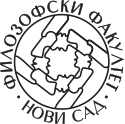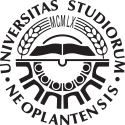15EM031 - Cultural Linguistics
| Course specification | ||||
|---|---|---|---|---|
| Course title | Cultural Linguistics | |||
| Acronym | 15EM031 | |||
| Study programme | English Language and Literature | |||
| Module | ||||
| Type of study | second degree master academic studies | |||
| Lecturer (for classes) | ||||
| Lecturer/Associate (for practice) | ||||
| Lecturer/Associate (for OTC) | ||||
| ESPB | 6.0 | Status | ||
| Condition | Pragmatics | Oblik uslovljenosti | ||
| The goal | Introducing the students to theoretical approaches and empirical research related to the interrelationship between language and extralinguistic knowledge as well as to the ways the linguistic and extralinguistic aspects affect the process of dynamic meaning construction and use of language from the perspective of cognitive linguistics, cultural linguistics, and ethnopragmatics. In addition to this, the aim is to approach the topics under investigation from an empirical perspective and apply specific analysis to research in order to critically assess the applicability of theoretical constructs as useful framework for their own research. | |||
| The outcome | students will understand and get to know relevant concepts and theoretical models in the field of cultural linguistics and applied cultural linguistics; students will be able to show critical and analytical skills when discussing theoretical models. students will be able to apply and transfer the gained knowledge in practice and their own research; students will be able to conceptualize and construct their own small-scale research, determine the hypothesis and research questions and select the appropriate theoretical framework | |||
| Contents | ||||
| Contents of lectures | explorations of language and culture (historical background); language relativity and cognitive linguistics; language and cultural models; language and cultural conceptualisations; universal vs. culture-specific; common emergent cultural conceptualisationsand their impact on language use; ethnopragmatics and cultural scripts; context as a dynamic construct; linguistic and extralinguistic elements and their impact on language use; various parameters as elements of extralinguistic knowledge (space, time, gender, social class, ethnic groups) and their influence on discourse; prototypes; stereotypes; salient meaning; folk conceptualisations as a basis of cultural models | |||
| Contents of exercises | practical application of theoretical constructs and models to specific analysis of different types of discourse; critical analysis of small-scale studies, the analysis of research topic proposals for students' own research | |||
| Literature | ||||
| ||||
| Number of hours per week during the semester/trimester/year | ||||
| Lectures | Exercises | OTC | Study and Research | Other classes |
| 2 | 2 | |||
| Methods of teaching | Lectures, practical classes, discussions, presentations, analysis | |||
| Knowledge score (maximum points 100) | ||||
| Pre obligations | Points | Final exam | Points | |
| Activites during lectures | 10 | Test paper | 30 | |
| Practical lessons | Oral examination | |||
| Projects | 30 | |||
| Colloquia | ||||
| Seminars | 30 | |||

